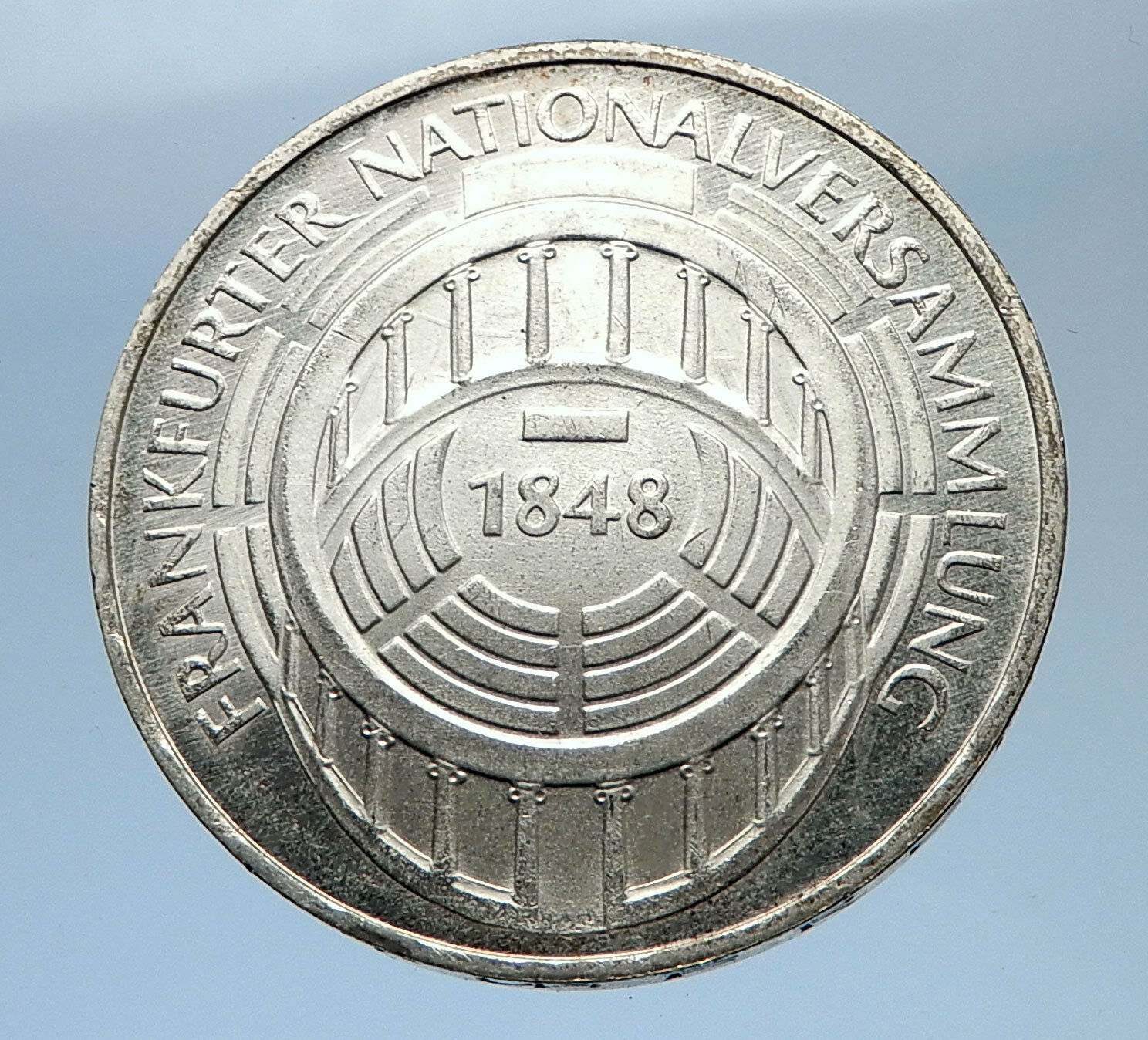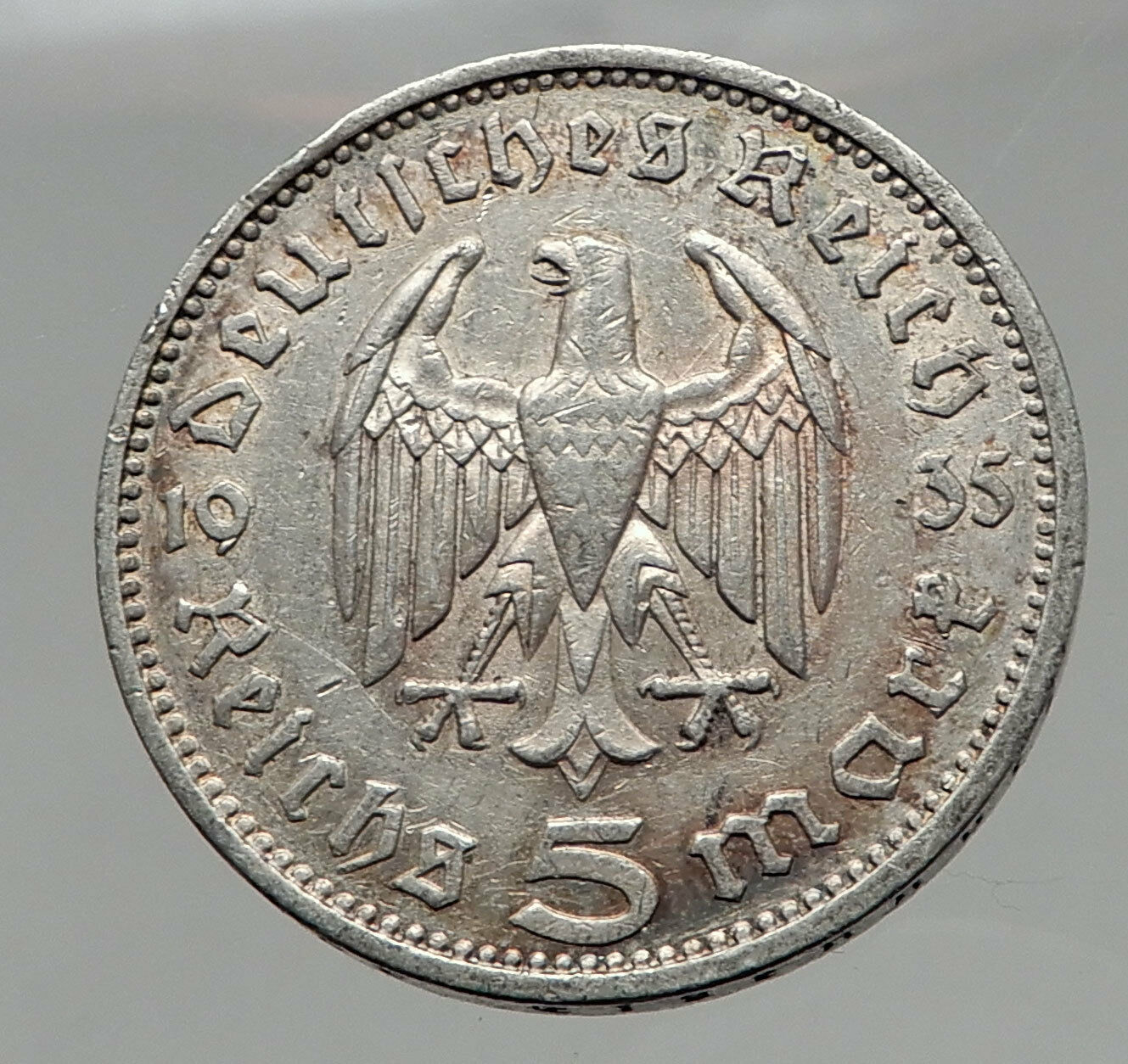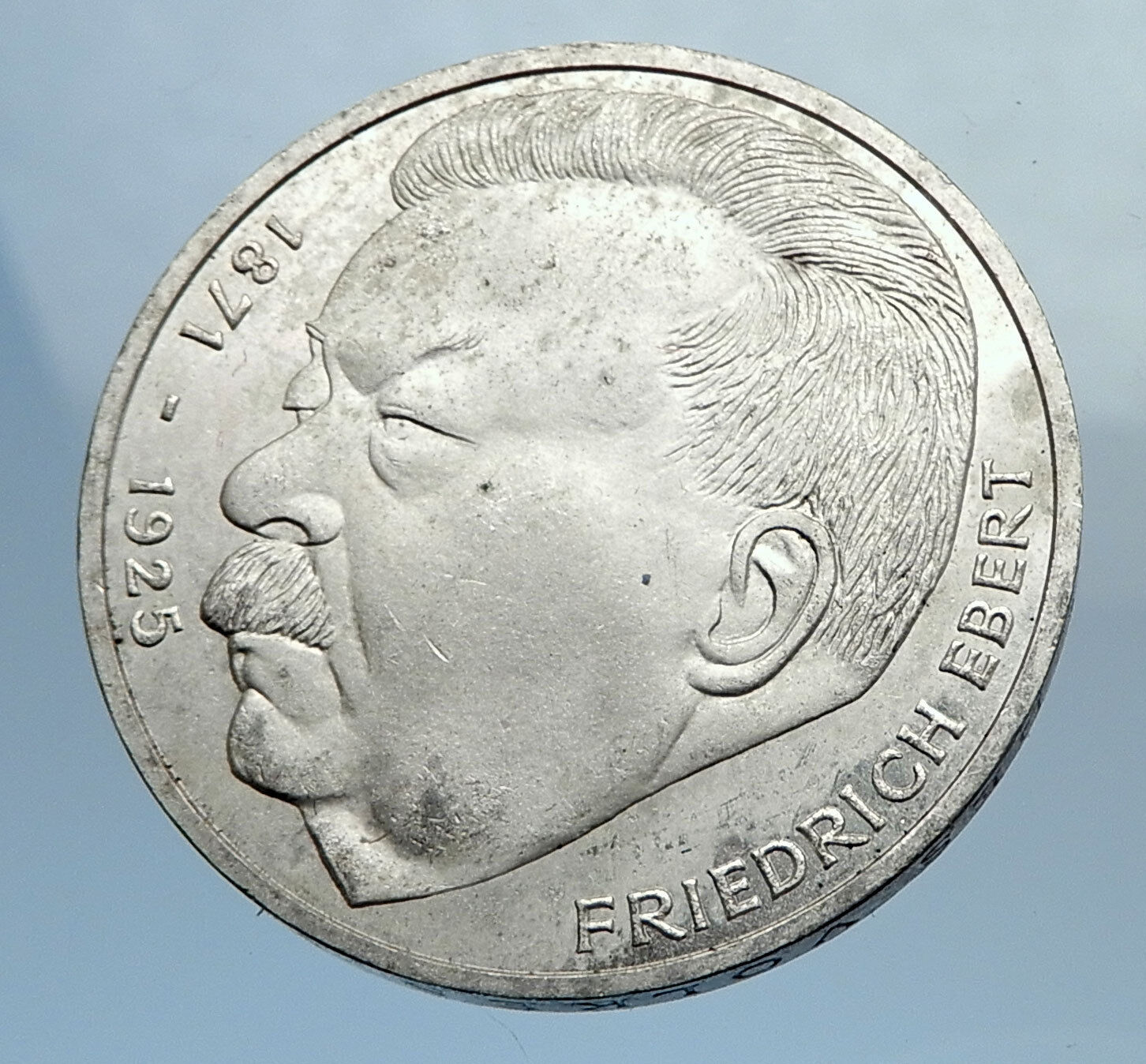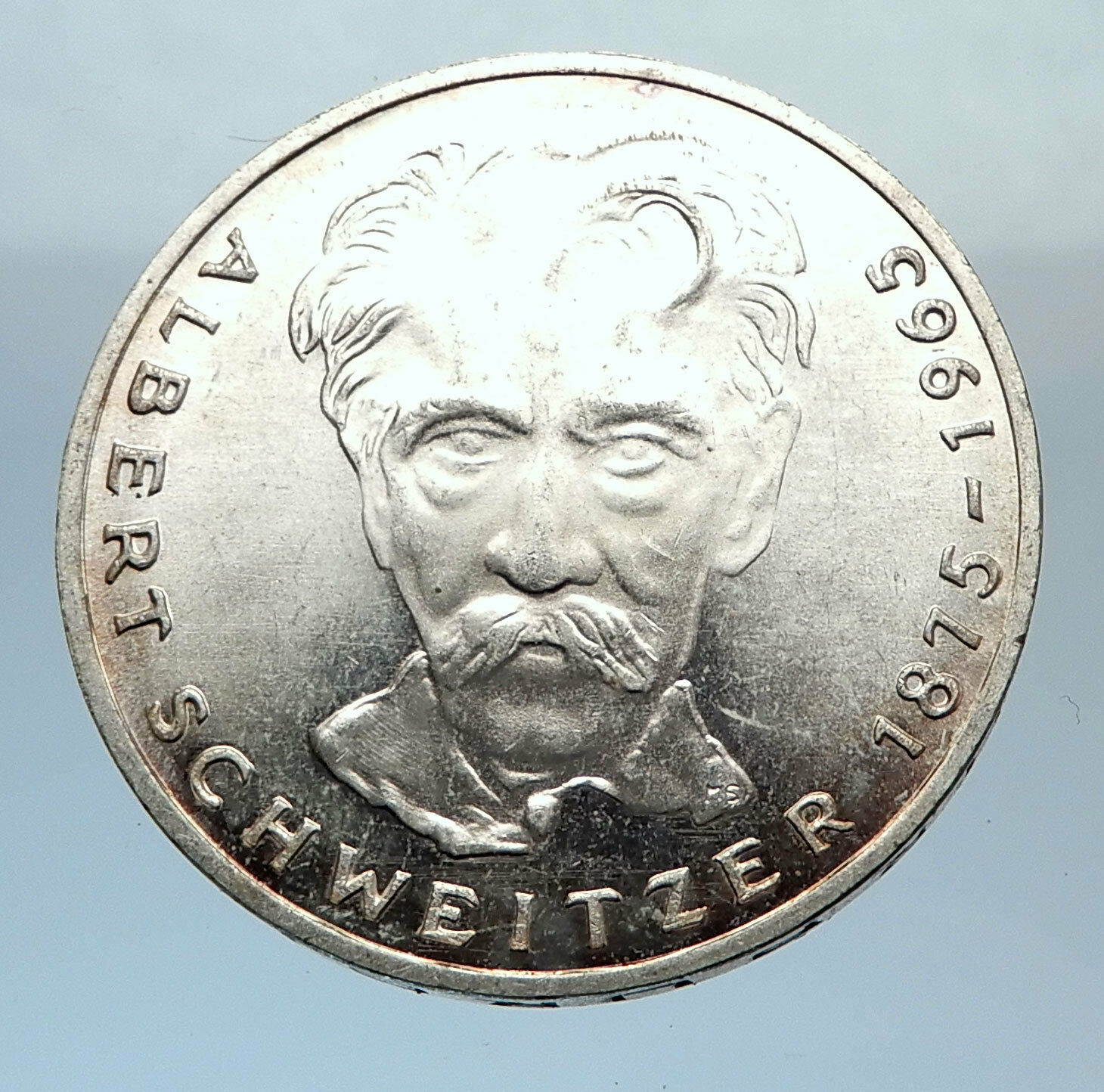|
Germany – 200th Anniversary – Birth of Ludwig van Beethoven
1970 F Silver 5 Marks 29mm (11.15 grams) 0.625 Silver (0.2251 oz. ASW)
Reference: KM# 127
BUNDESREPUBLIK DEUTSCHLAND 1970 5 DEUTSCHE MARK F, An eagle, emblem of the German Federal Republic Issuing date and face value Stuttgart mint mark (F).
· LUDWIG VAN BEETHOVEN · 1770-1827, Portrait of the composer and organist Ludwig van Beethoven, born on december 16th 1770 and dead in Vienna in 1827.
Edge Lettering:
ALLE MENSCHEN WERDEN BRÜDER
You are bidding on the exact item pictured, provided with a Certificate of Authenticity and Lifetime Guarantee of Authenticity.
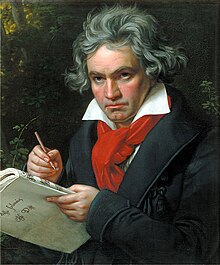 Ludwig van Beethoven (baptised 17 December 1770 – 26 March 1827) was a German composer and pianist. He was a crucial figure in the transition between the classical and romantic eras in classical music and is considered to be one of the greatest composers of all time. Ludwig van Beethoven (baptised 17 December 1770 – 26 March 1827) was a German composer and pianist. He was a crucial figure in the transition between the classical and romantic eras in classical music and is considered to be one of the greatest composers of all time.
Beethoven was born in Bonn, the capital of the Electorate of Cologne, which was part of the Holy Roman Empire. His musical talent was obvious at an early age, and he was harshly and intensively taught by his father Johann van Beethoven, who thought this would enable him to become a child prodigy like Mozart. He was later taught by the composer and conductor Christian Gottlob Neefe. At age 21, he moved to Vienna and studied composition with Joseph Haydn. Beethoven then gained a reputation as a virtuoso pianist, and he was soon courted by Karl Alois, Prince Lichnowsky for compositions, which resulted in Opus 1 in 1795.
The piece was a great critical and commercial success and was followed by Symphony No. 1 in 1800. This composition was distinguished by its frequent use of sforzandi, sudden shifts in tonal centers (which were uncommon for traditional symphonic form), and the prominent, more independent use of wind instruments. In 1801, he also gained fame for his six String Quartets and for the ballet The Creatures of Prometheus. During this period, his hearing began to deteriorate, but he continued to conduct, premiering his third and fifth symphonies in 1804 and 1808, respectively. His condition worsened to almost complete deafness by 1811, and he then gave up performing and appearing in public.
During this period of self-exile, Beethoven composed many of his most admired works; his seventh symphony premiered in 1813, with its second movement, Allegretto, achieving widespread critical acclaim. He composed his Missa Solemnis for a number of years before it premiered prior to his ninth symphony in 1824, with the latter gaining fame for being among the first examples of a choral symphony. In 1826, his fourteenth String Quartet was noted not only for its seven linked movements played without a break and is considered the final major piece performed before his death a year later.
His career is conventionally divided into early, middle, and late periods; the “early” period is typically seen to last until 1802, the “middle” period from 1802 to 1812, and the “late” period from 1812 to his death in 1827. During his life, he composed nine symphonies, five piano concertos, one violin concerto, thirty-two piano sonatas, sixteen string quartets, two masses, and the opera Fidelio. Other works, like Für Elise, were discovered after his death and are also considered historic musical achievements. Beethoven’s legacy is characterized by his innovative compositions, including innovative combinations of vocals and instruments, and also by widening the scope of the sonata, symphony, concerto, and quartet, while he is also noted for his troublesome relationship with his contemporaries.
  Germany, officially the Federal Republic of Germany is a federal parliamentary republic in western-central Europe. It includes 16 constituent states and covers an area of 357,021 square kilometres (137,847 sq mi) with a largely temperate seasonal climate. Its capital and largest city is Berlin. With 81 million inhabitants, Germany is the most populous member state in the European Union. After the United States, it is the second most popular migration destination in the world. Germany, officially the Federal Republic of Germany is a federal parliamentary republic in western-central Europe. It includes 16 constituent states and covers an area of 357,021 square kilometres (137,847 sq mi) with a largely temperate seasonal climate. Its capital and largest city is Berlin. With 81 million inhabitants, Germany is the most populous member state in the European Union. After the United States, it is the second most popular migration destination in the world.
Various Germanic tribes have occupied northern Germany since classical antiquity. A region named Germania was documented before 100 CE. During the Migration Period the Germanic tribes expanded southward. Beginning in the 10th century, German territories formed a central part of the Holy Roman Empire. During the 16th century, northern German regions became the centre of the Protestant Reformation.
The rise of Pan-Germanism inside the German Confederation resulted in the unification of most of the German states in 1871 into the Prussian-dominated German Empire. After World War I and the German Revolution of 1918-1919, the Empire was replaced by the parliamentary Weimar Republic. The establishment of the Third Reich in 1933 led to World War II and the Holocaust. After 1945, Germany split into two states, East Germany and West Germany. In 1990, the country was reunified.
 In the 21st century, Germany is a great power and has the world’s fourth-largest economy by nominal GDP, as well as the fifth-largest by PPP. As a global leader in several industrial and technological sectors, it is both the world’s third-largest exporter and importer of goods. Germany is a developed country with a very high standard of living sustained by a skilled and productive society. It upholds a social security and universal health care system, environmental protection and a tuition free university education. In the 21st century, Germany is a great power and has the world’s fourth-largest economy by nominal GDP, as well as the fifth-largest by PPP. As a global leader in several industrial and technological sectors, it is both the world’s third-largest exporter and importer of goods. Germany is a developed country with a very high standard of living sustained by a skilled and productive society. It upholds a social security and universal health care system, environmental protection and a tuition free university education.
Germany was a founding member of the European Union in 1993. It is part of the Schengen Area, and became a co-founder of the Eurozone in 1999. Germany is a member of the United Nations, NATO, the G8, the G20, and the OECD. The national military expenditure is the 9th highest in the world. Known for its rich cultural history, Germany has been continuously the home of influential artists, philosophers, musicians, sportsmen, entrepreneurs, scientists and inventors.
|




 Ludwig van Beethoven (baptised 17 December 1770 – 26 March 1827) was a German composer and pianist. He was a crucial figure in the transition between the classical and romantic eras in classical music and is considered to be one of the greatest composers of all time.
Ludwig van Beethoven (baptised 17 December 1770 – 26 March 1827) was a German composer and pianist. He was a crucial figure in the transition between the classical and romantic eras in classical music and is considered to be one of the greatest composers of all time. 
 Germany, officially the Federal Republic of Germany is a federal parliamentary republic in western-central Europe. It includes 16 constituent states and covers an area of 357,021 square kilometres (137,847 sq mi) with a largely temperate seasonal climate. Its capital and largest city is Berlin. With 81 million inhabitants, Germany is the most populous member state in the European Union. After the United States, it is the second most popular migration destination in the world.
Germany, officially the Federal Republic of Germany is a federal parliamentary republic in western-central Europe. It includes 16 constituent states and covers an area of 357,021 square kilometres (137,847 sq mi) with a largely temperate seasonal climate. Its capital and largest city is Berlin. With 81 million inhabitants, Germany is the most populous member state in the European Union. After the United States, it is the second most popular migration destination in the world. In the 21st century, Germany is a great power and has the world’s fourth-largest economy by nominal GDP, as well as the fifth-largest by PPP. As a global leader in several industrial and technological sectors, it is both the world’s third-largest exporter and importer of goods. Germany is a developed country with a very high standard of living sustained by a skilled and productive society. It upholds a social security and universal health care system, environmental protection and a tuition free university education.
In the 21st century, Germany is a great power and has the world’s fourth-largest economy by nominal GDP, as well as the fifth-largest by PPP. As a global leader in several industrial and technological sectors, it is both the world’s third-largest exporter and importer of goods. Germany is a developed country with a very high standard of living sustained by a skilled and productive society. It upholds a social security and universal health care system, environmental protection and a tuition free university education.

